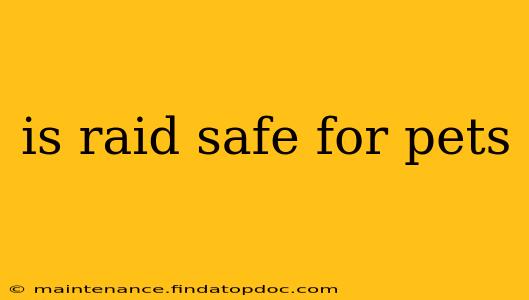Raid, and other insecticide brands containing pyrethroids, are commonly used to control household pests. However, the question of Raid's safety for pets is a crucial one for pet owners. The short answer is: no, Raid is not safe for pets. Exposure to Raid, even in small amounts, can pose significant health risks to your furry friends. This guide will delve deeper into the potential dangers, safer alternatives, and steps to take in case of accidental exposure.
What are the Dangers of Raid to Pets?
Raid products contain insecticides, primarily pyrethroids, which are neurotoxins. These chemicals affect the nervous system of both insects and animals. The severity of the effects depends on several factors, including:
- The amount ingested or inhaled: A small amount might cause mild symptoms, while a larger dose could be life-threatening.
- The pet's size and species: Smaller animals are more vulnerable to poisoning than larger ones. Cats, in particular, are more susceptible to pyrethroid toxicity.
- The pet's pre-existing health conditions: Pets with underlying health issues are more likely to experience severe reactions.
Symptoms of Raid poisoning in pets can range from mild to severe and may include:
- Tremors or shaking: This is often one of the first signs of pyrethroid poisoning.
- Excessive drooling or salivation: Your pet may drool uncontrollably.
- Vomiting or diarrhea: Gastrointestinal upset is a common symptom.
- Difficulty breathing: In severe cases, Raid poisoning can lead to respiratory distress.
- Seizures: This is a serious symptom that requires immediate veterinary attention.
- Weakness or incoordination: Your pet may appear unsteady on its feet.
- Lethargy or depression: They might be unusually sluggish and unresponsive.
What should I do if my pet is exposed to Raid?
Immediate action is crucial if you suspect your pet has been exposed to Raid. Do NOT induce vomiting unless instructed by a veterinarian. Here’s what you should do:
- Identify the product: Note the name and active ingredients of the Raid product involved.
- Remove your pet from the area: Get your pet out of the contaminated area immediately.
- Contact your veterinarian or an animal poison control center immediately: They can provide guidance on how to proceed based on the specific situation. (The ASPCA Animal Poison Control Center is a valuable resource.)
- Follow their instructions carefully: Your vet may advise bringing your pet in for examination and treatment.
- Keep the Raid product container: This will be helpful for the vet to determine the appropriate course of treatment.
Are there pet-safe alternatives to Raid?
Fortunately, yes! There are many safer and more pet-friendly alternatives for pest control available. Consider these options:
- Natural pest control methods: These include using essential oils (like peppermint or tea tree oil – use cautiously and research thoroughly), diatomaceous earth, or sticky traps.
- Professional pest control services: A professional exterminator can use less toxic methods that are safer for pets. Be sure to inform them of your pets before they begin treatment.
- Environmentally friendly pest control products: Research products specifically labeled as safe for pets and the environment.
How can I prevent Raid exposure in my home?
Prevention is always the best approach. Here are some tips to minimize the risk of your pets being exposed to Raid or similar products:
- Store insecticides out of reach: Keep all pesticides, including Raid, in a locked cabinet or high shelf that your pets cannot access.
- Use pest control products sparingly: Only use insecticides when absolutely necessary, and follow the instructions carefully.
- Properly ventilate the area: If you must use Raid, ensure the area is well-ventilated to reduce exposure.
- Supervise pets during application: Keep your pets out of the room while applying any pesticides.
- Thoroughly clean the area after use: Clean any surfaces where insecticides were sprayed to remove residue.
What if my pet shows symptoms but I'm not sure it was Raid?
Even if you're unsure about the cause of your pet's symptoms, it's always best to err on the side of caution and contact your veterinarian or animal poison control center immediately. Early intervention can significantly improve your pet's chances of recovery.
In conclusion, while Raid might seem like a convenient solution for pest control, it's crucial to prioritize your pet's safety. Consider the risks, explore safer alternatives, and take preventative measures to protect your beloved furry companions from potential harm. Always contact a veterinarian or animal poison control center if you suspect your pet has ingested or been exposed to any potentially harmful substance.
